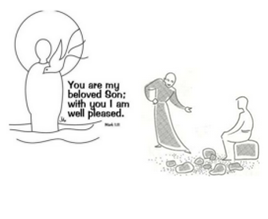the emptying of Christ Jesus
26-11-2013 - Posted by Andre PietPhilippians 2:5-8 is a familiar Bible passage, where Paul talks about the emptying of Christ Jesus.
5 For let this disposition be in you, which is in Christ Jesus also, 6 Who, being inherently in the form of God, deems it not pillaging to be equal with God, 7 nevertheless empties Himself, taking the form of a slave, coming to be in the likeness of humanity, 8 and, being found in fashion as a human, He humbles Himself, becoming obedient unto death, even the death of the cross.
Traditionally, verses 5 through 7 are very much involved in the discussion about the pre-existence and the incarnation of Christ. Wrongly so, in my opinion, because there are solid reasons to be considered in connection with the emptying of Himself, after His baptism in the Jordan River.
consideration #1
The incarnation (see: John 1:14) was an act of God, the Father. He begot His son when the power of the Most High overshadowed Mary. In this, the son was absolutely passive. Not the son became man, but because God begat Him in the mother’s womb, He, therefore, is God’s son, according to Luke 1:35.
consideration #2
The emptying relates to the disposition of Christ Jesus. This name He bears as a human being, because He is “the man Christ Jesus” (1Tim.2:5). It is even more specific: Jesus Christ is an official name, and it refers to what He was doing as Christ, i.e., as anointed. He was anointed, says Peter in Acts 10:38, after He, at His baptism in the Jordan River, came up out of the water and the Spirit descended upon Him in the form of a dove.
consideration #3
When Jesus was anointed with the Spirit, a voice from heaven announced: “You are my beloved son”. And John the Baptist testified (John 1:32-34):
I saw the Spirit descending from heaven like a dove (…) And I saw, and bare record that this is the Son of God.
Behold “the form of God” – as is the Father, so is the Son (John 14:9).
consideration #4
As Son of God, Jesus was equal to God, i.e., comparatively; as the Jews, later, accused Him.
Therefore, then, the Jews sought the more to kill Him, for He not only annulled the sabbath, but also said His own Father is God, making Himself equal to God.
-John 5:18-
consideration #5
After Jesus was anointed, He was led into the desert, where the diabolos tempted Him to do things proving Himself to be the Son of God.
And, approaching, the trier said to Him, “If you are God’s Son, say that these stones may be becoming cakes of bread.” -Matthew 4:3 (See also 4:6)-
But Jesus refused to do this, because His mission was not to be served, but to serve (Mat.20:28). That is His emptying: not to assert Himself as Son of God, but as an obedient slave.
consideration #6
Because Jesus emptied Himself of the form of God, He took on the likeness of humanity. What distinguished Him as the Son of God to the people, was no longer visible.
consideration #7
Hebrews 5:8 says:
even He also, being a Son, learned obedience from that which He suffered.
As Son of God, in the midst of people, Jesus could demand obedience. But because he relinquished this position, He, Himself, learned obedience in the pathway of humiliation. He became obedient unto death, even the death of the cross.
Conclusion
The above considerations make it clear, in my opinion, that Paul is not referring to a celestial being who transformed Himself into a human-in-the-making. No, Paul refers to what Christ Jesus did, as such (i.e. since His anointing). He renounced His position as Son of God and then, as a slave, became obedient to the death of the cross. That is the disposition of Christ Jesus, which Paul to the Philippians presented as an example. ![]()

 English Blog
English Blog
